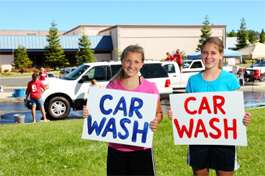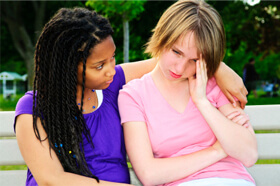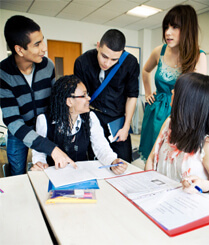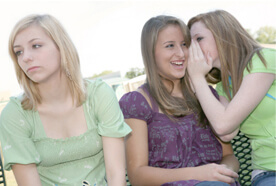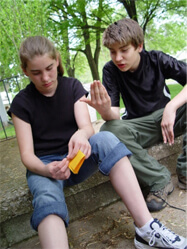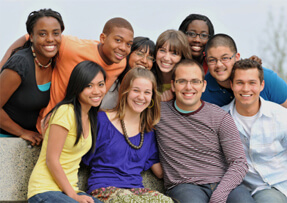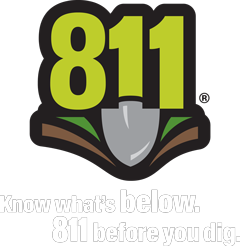We all have to make some tough decisions in our lives. What would YOU do if…
- You saw a classmate cheating on an important test?
- Your best friend asked you to do a favor that involved lying for her?
- You overheard some kids at school planning to play a nasty trick on another student?
Knowing the right thing to do – and doing it – can be really hard sometimes!

Understanding Ethics
Have you ever heard the phrase, "It's as simple as black and white?" People often use this analogy, or comparison, when referring to making a decision. The colors black and white are easy to recognize, and sometimes, when we need to make a decision between right and wrong, it is easy to recognize the right decision.
 Sometimes, though, we must choose between making a 'good' decision that may have seemingly undesirable consequences, and a 'bad' decision that seems more comfortable to us. You could call this a gray area, because there is no clear separation between black and white – the colors seem to have merged. When we're faced with a gray area, ethics can help us out.
Sometimes, though, we must choose between making a 'good' decision that may have seemingly undesirable consequences, and a 'bad' decision that seems more comfortable to us. You could call this a gray area, because there is no clear separation between black and white – the colors seem to have merged. When we're faced with a gray area, ethics can help us out.
What is ethics?
A person who consistently makes good decisions has strong character. In this context, the definition of strong character is "ethical quality." What do you think "ethical" means? Now look up the word in the dictionary. How close were you?
What would you do?
Grace's best friend Sylvie wants to go to a concert with some friends. Sylvie's parents will not give her permission to go – they say that a concert is not a safe place for a 6th grader. Sylvie tells Grace she is going to tell her parents that she's staying overnight with Grace so she can go to the concert. Sylvie asks Grace to 'cover for her.' If you were Grace, what would you do?
Going further
Integrity in action
Integrity means sticking to ethical principles and beliefs and being honest with one's self and others. Another definition of integrity is the state of being whole, entire or strong. For example, if the leg of a chair becomes loose, the chair loses integrity.
How do you think these two definitions work together?
- Do you have integrity?
- Do you obey rules and codes of conduct?
- Do you do the right thing, even when the right thing isn't easy?
- Are you always true to (honest with) yourself?
- Have you ever stood up for something that you felt was right, even though others did not agree with you? How did you feel afterward?
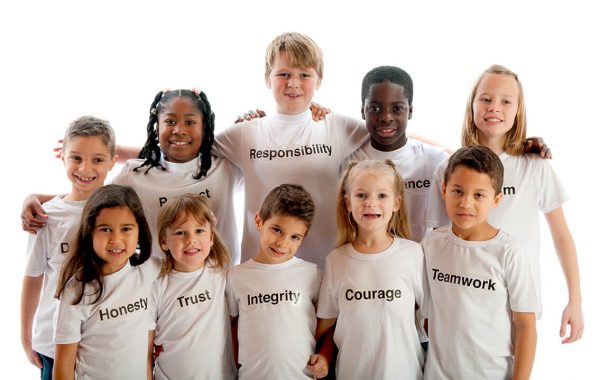
- Do you have integrity?
- Do you obey rules and codes of conduct?
- Do you do the right thing, even when the right thing isn't easy?
- Are you always true to (honest with) yourself?
- Have you ever stood up for something that you felt was right, even though others did not agree with you? How did you feel afterward?

What would you do?
 Professional golfer Brian Davis did something that demonstrates how honesty and integrity work hand-in-hand. After being announced the winner of the Verizon Heritage golf tournament, Brian told judges that he might have hit some weeds while swinging at the ball that had helped secure his victory.
Professional golfer Brian Davis did something that demonstrates how honesty and integrity work hand-in-hand. After being announced the winner of the Verizon Heritage golf tournament, Brian told judges that he might have hit some weeds while swinging at the ball that had helped secure his victory.
When the judges reviewed a video tape of the swing in question, they saw that Davis did indeed brush against weeds on his backstroke. Hitting an obstacle while taking a swing carried a two-stroke penalty. This meant that Brian lost the game – but by telling the truth, he gained integrity. If Brian had not told the truth, he would have won the tournament. Do you think he would have felt like a winner?
Going further
Respect & tolerance
Every person is unique. Even identical twins have unique characteristics. It is important to be respectful and tolerant of people with beliefs, traits and practices that are different from our own. In fact, it is beneficial. Imagine a world where everyone looks, thinks and acts alike: Bo-ring!
Diversity is what makes our lives interesting and challenging. Being tolerant and respectful exposes us to new opportunities, experiences and ideas.
Chew on this: What if your family and friends did not like pizza and, because they did not like pizza, you never tasted it. Think what you would be missing!

At the movies
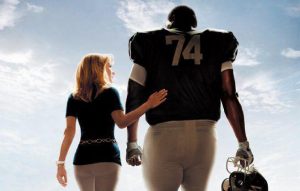 The movie The Blind Side is about a family that adopts a homeless teenager. Despite many cultural differences – race, education, income – the family is able to bring the teenager into their home and change his life. In the process, the family is also changed for the better.
The movie The Blind Side is about a family that adopts a homeless teenager. Despite many cultural differences – race, education, income – the family is able to bring the teenager into their home and change his life. In the process, the family is also changed for the better.
Going further
Exploring respect & tolerance in groups
Watch the movie The Blind Side and make a list of the benefits that came to the family from opening their home to someone with such a different background.
Cooperation & commitment
When working in a group, each individual plays an important role in the effort to achieve a common goal. A team or group functions better when all its members practice cooperation. Sometimes, however, the individual's goals and the team's goals can conflict.
The following story demonstrates how one gymnast sacrificed her individual goals for the benefit of her team.
 Keri Strug, an American gymnast, competed in the Olympics in 1996. During the team competition, Keri sprained her ankle as she landed a vault. As she limped to the vault runs, she turned to her coach and asked him, "Do we need this?" The answer was, "yes." It was a very close competition and, in order for the US women's gymnastics team to cinch the gold medal, Keri had to complete her second vault.
Keri Strug, an American gymnast, competed in the Olympics in 1996. During the team competition, Keri sprained her ankle as she landed a vault. As she limped to the vault runs, she turned to her coach and asked him, "Do we need this?" The answer was, "yes." It was a very close competition and, in order for the US women's gymnastics team to cinch the gold medal, Keri had to complete her second vault.
Keri vaulted and landed on both feet for barely a second before jerking her sore ankle off the mat. She saluted the judges standing on one leg. Keri's successful completion of the vault won the gold medal for her team, but left her injured and unable to compete in the individual competition, even though she had qualified.
Keri demonstrated both courage and a commitment to her team when she pushed beyond her limits for the benefit of the team's goal – the Olympic gold. Her moment – her vault landing – is considered one of the most inspirational moments in Olympic history.
Cooperation is an important character trait, but sometimes cooperation isn't enough – that's when commitment comes into play.


Going further
Compassion & community
Everyone is a member of a community.
A community is a group of people living in a common location or sharing common interests. When we function as part of a community, we share an experience with others and need to compassionately consider the needs of the whole.
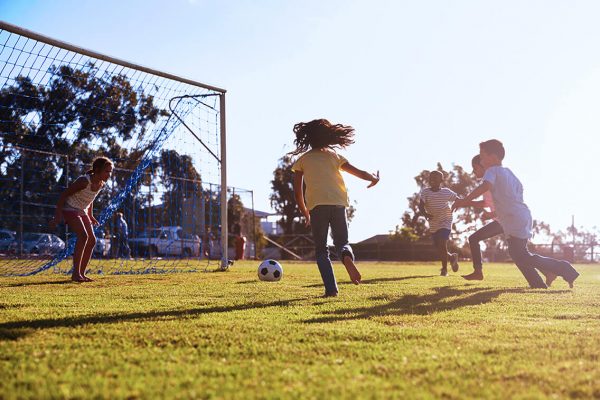

Going further
Taking responsibility
Being responsible stands for many things
- Obeying rules, regulations and laws;
- Being on time or punctual;
- Being safe and doing your best to keep others safe and healthy;
- Preserving the environment and natural resources;
- Supporting the members of your communities;
- Cooperating with others;
- Being open to new ideas and experiences;
- Being fair and honest; and
- Reporting irresponsible behavior, even when it is your own;
- But most of all it stands for doing the right thing, especially when the right thing isn't easy to do.

Being responsible stands for many things
- Obeying rules, regulations and laws;
- Being on time or punctual;
- Being safe and doing your best to keep others safe and healthy;
- Preserving the environment and natural resources;
- Supporting the members of your communities;
- Cooperating with others;
- Being open to new ideas and experiences;
- Being fair and honest; and
- Reporting irresponsible behavior, even when it is your own;
- But most of all it stands for doing the right thing, especially when the right thing isn't easy to do.

Going further
Leadership & innovation
Good leaders have many great character traits.
Going further
Code of conduct
Codes of conduct help guide our actions and support our decision-making. When rules are clearly stated, it is easier to recognize proper actions (ethical conduct) from improper actions (unethical conduct).

Ethical conduct means…
- Doing the most good and the least harm
- Respecting the rights and beliefs of others
- Treating people fairly and equally
- Obeying laws, rules, regulations, codes of conduct, etc.
- Acting in good character
Codes of conduct help us identify the possible consequences of our decisions. They also can provide guidance about whom to contact when you are unsure if an action you would like to take is ethical or unethical. Lastly, codes of conduct help groups and communities function more smoothly and comfortably.
What would you do?
Practice unethical conduct
–OR–
Practice ethical conduct
Going further
Think about it. If you had to write a code of conduct for your classroom, what rules or codes would you include?
Ethical decision-making
Let's use the ethical dilemma presented in the Understanding ethics (Grace and her best friend Sylvie – read it again below) to practice the steps of ethical decision-making.
What would you do?
Grace's best friend Sylvie wants to go to a concert with some friends. Sylvie's parents will not give her permission to go – they say that a concert is not a safe place for a 6th grader. Sylvie tells Grace she is going to tell her parents that she's staying overnight with Grace so she can go to the concert. Sylvie asks Grace to 'cover for her.' If you were Grace, what would you do?



